Markets react to geopolitical tensions, inflation data, and monetary policy shifts.
Friday saw the dollar hold strong above 107 on rate hike expectations, while gold hit $2,680, marking its fifth straight gain. Silver rebounded to $31, supported by geopolitical tensions and steady Chinese policy. In forex, GBP/USD slid on rising UK inflation, and USD/JPY traded near 154.85 after weak Japanese manufacturing data.
| Time | Cur. | Event | Forecast | Previous |
| 07:30 | GBP | Retail Sales MoM | 0.3% | -0.3% |
| 08:30 | EUR | HCOB Manufacturing PMI Flash | 43.5 | 43 |
| 08:30 | EUR | ECB President Lagarde’s Speech | ||
| 14:45 | USD | S&P Global Services PMI Flash | 49.8 | 49.9 |
| 14:45 | USD | S&P Global Manufacturing PMI Flash | 49.2 | 48.5 |
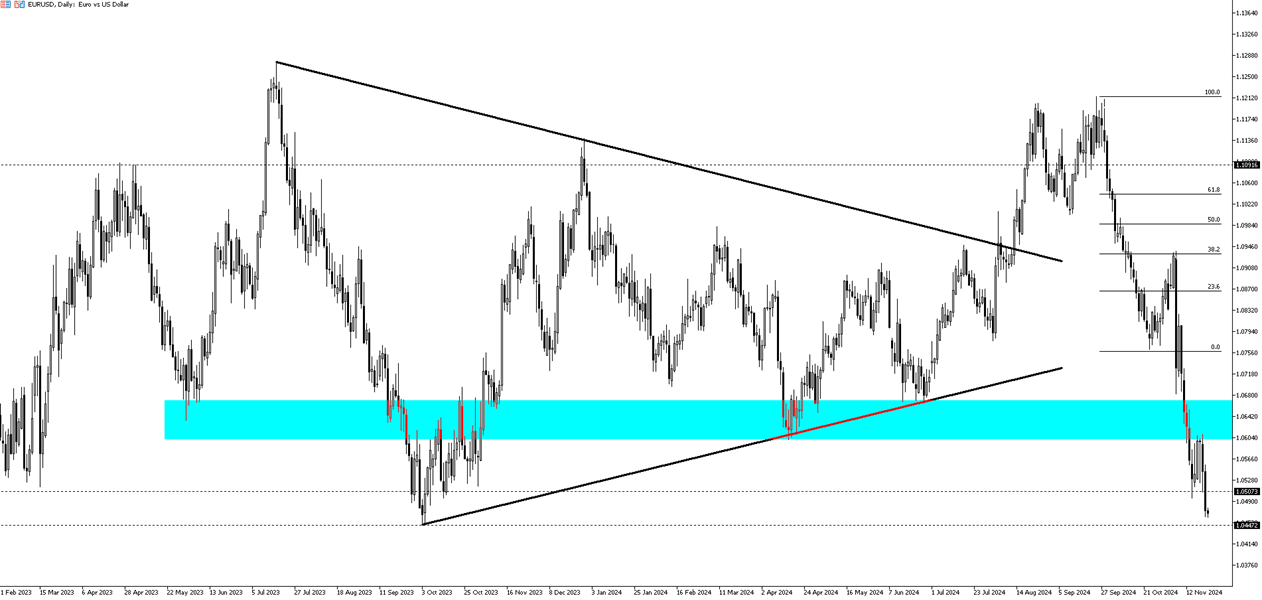
On Friday, the dollar index stayed above 107, near its highest level in two years, and the EUR/USD is trading around 1.0475 as investors evaluated the Fed's monetary policy outlook. Thursday's data showed that the initial US jobless claims unexpectedly dropped to a seven-month low, indicating a strong labor market. Investors are now looking forward to business activity data later today and inflation figures next week for more economic insights. Currently, markets estimate about a 60% chance of a 25-basis-point rate cut by the Fed in December, with some traders anticipating a temporary pause.
The dollar has also been supported by expectations that policies of Trump, especially regarding tariffs, immigration, and taxes, could spur inflation and restrict the Fed's ability to reduce borrowing costs. In contrast, the euro and yuan have weakened as Europe and China brace for the potential effects of Trump's tariffs.
The first support will be at 1.0450, and if this level is broken, 1.0400 and 1.0360 will be followed in sequence. On the upside, the first resistance will be at 1.0520, followed by 1.0610 and 1.0640 in sequence.
| R1: 1.0520 | S1: 1.0450 |
| R2: 1.0610 | S2: 1.0400 |
| R3: 1.0640 | S3: 1.0360 |
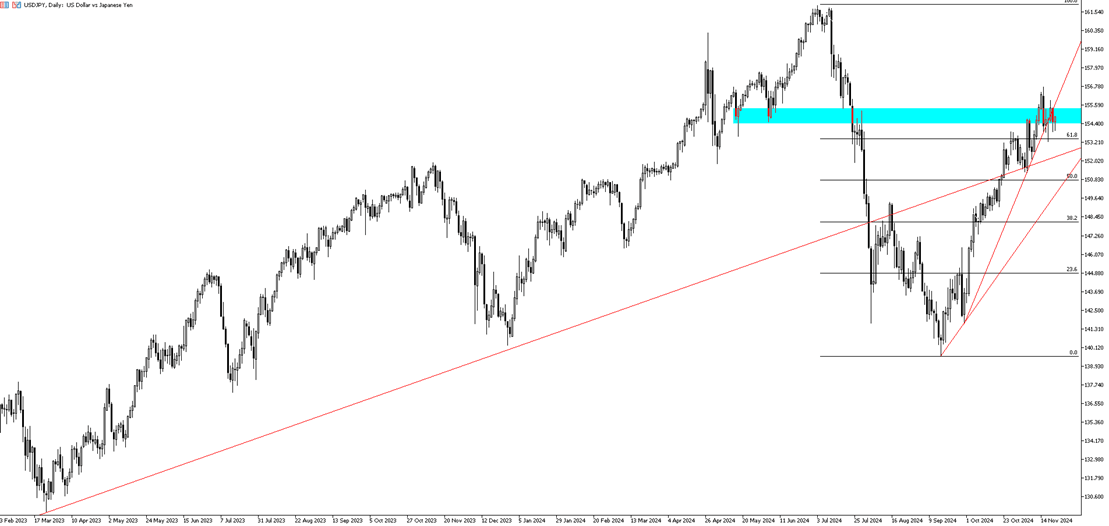
The USD/JPY pair is trading around 154.85 on Friday morning. The au Jibun Bank Japan Manufacturing PMI unexpectedly fell to 49.0 in November 2024, the lowest level since March, down from a final reading of 49.2 in October and missing market expectations of 49.5, according to preliminary data. This marks the fifth consecutive month of declining factory activity, with both output and new orders decreasing, the former experiencing the sharpest drop since April. Foreign demand and purchasing levels remained weak, although the pace of their decline slowed. Companies reduced employment for the first time since February, and backlogs of work decreased significantly. Delivery times continued to lengthen but at a slower rate.
In terms of pricing, input cost inflation eased to a seven-month low, while output cost inflation rose to its highest level since July. Despite these challenges, business sentiment showed improvement.
For the USD/JPY pair, the first resistance level is at 156.10, followed by 157.50 and 158, respectively. On the downside, the first support level is at 153.80, with subsequent support levels to watch at 152.50 and 151.80, respectively.
| R1: 156.10 | S1: 153.80 |
| R2: 157.50 | S2: 152.50 |
| R3: 158.00 | S3: 151.80 |
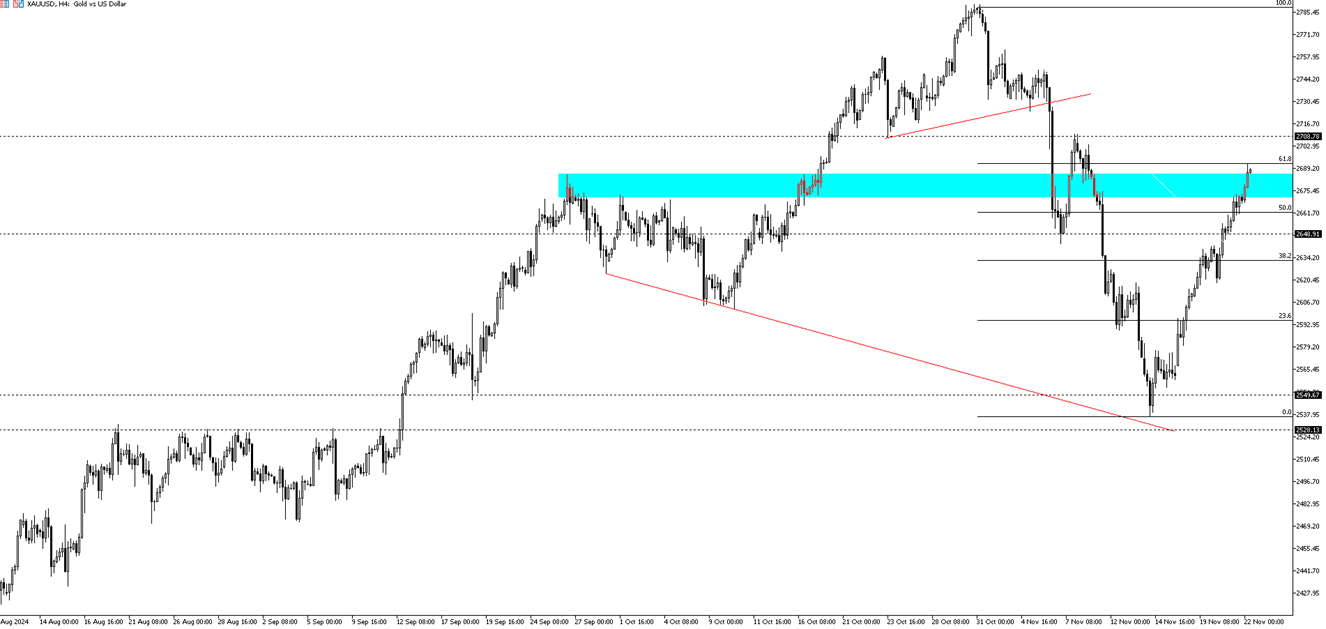
Gold rose to $2,680 per ounce on Friday, marking its fifth consecutive increase and setting it on track for a nearly 5% gain this week as investors sought safe-haven assets amid escalating geopolitical tensions. Earlier in the week, Ukraine launched its second Western-supplied missile into Russia, and on Thursday, Kyiv's air force reported that Russia fired its first intercontinental ballistic missile at Ukraine in retaliation.
Meanwhile, markets continued to assess the Federal Reserve’s monetary policy outlook after US jobless claims unexpectedly decreased, fueling speculation about a slower pace of Fed rate cuts. Traders also analyzed comments from Fed Bank of Chicago President Goolsbee, who suggested that interest rates could decrease "a fair bit" and expressed confidence that inflation is moving toward the target. Most of the market still anticipates a 25 bps rate cut in December, which would reduce the opportunity cost of holding non-interest-bearing gold.
For XAU/USD, the first resistance level is at 2,692, followed by 2,712 and 2,750, respectively. On the downside, the first support level is at 2,665, with subsequent levels to watch at 2,630 and 2,590, respectively.
| R1: 2692 | S1: 2665 |
| R2: 2712 | S2: 2630 |
| R3: 2750 | S3: 2590 |
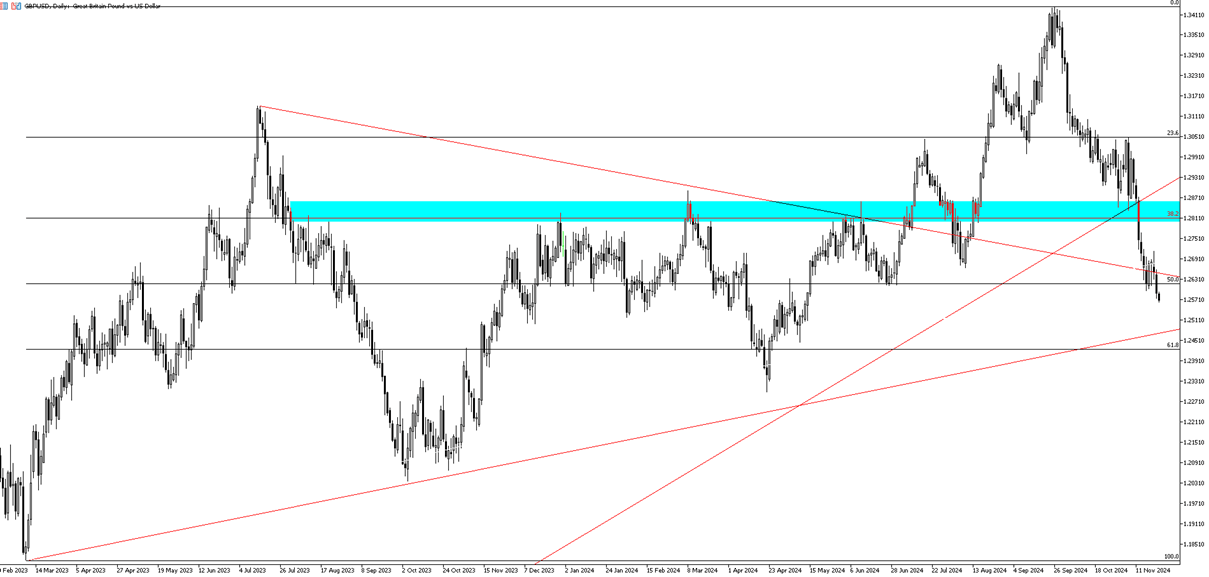
The British pound is trading around 1.2570 as of this morning, nearing the six-month low it reached last week amid escalating tensions between Russia and Ukraine. Reports indicate that Ukraine has launched UK-supplied cruise missiles into Russia for the first time. Earlier in the week, the pound briefly touched $1.271 after a stronger-than-expected inflation reading, which reaffirmed the Bank of England's cautious stance on future interest rate cuts.
In October, the UK’s annual inflation rate rose to 2.3%, the highest in six months, up from 1.7% in September. This exceeded both the Bank of England’s target and the market’s forecast of 2.2%. Inflation in services, a key indicator of domestic price pressures closely monitored by the central bank, edged up slightly to 5% from 4.9%. As a result, markets are now pricing in only a 14% chance of a rate cut this year, with expectations for just two cuts in 2025.
The first resistance level for the pair is at 1.2620, followed by 1.2680 and 1.2720, respectively. On the downside, the first support level is at 1.2550, with subsequent levels to watch at 1.2520 and 1.2475.
| R1: 1.2620 | S1: 1.2550 |
| R2: 1.2680 | S2: 1.2520 |
| R3: 1.2720 | S3: 1.2475 |
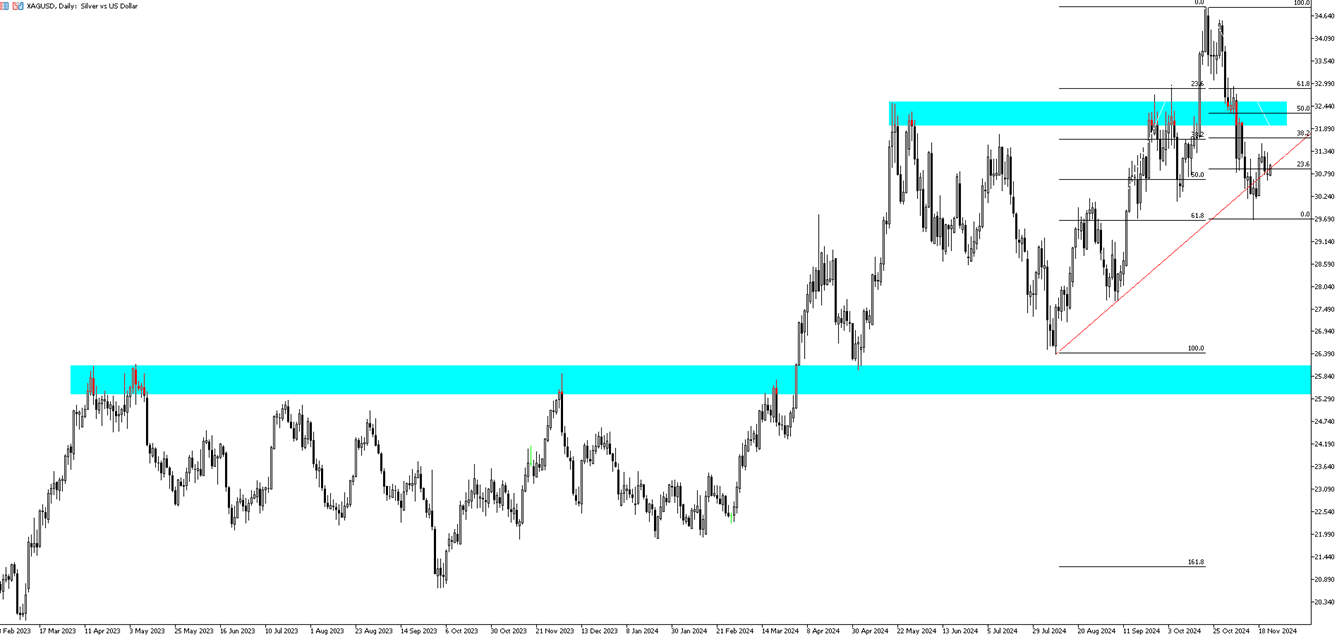
Silver prices are trading around $31 per ounce on Friday morning, rebounding from losses in the previous session. On Wednesday, Ukraine launched a series of UK-made missiles into Russia, following an earlier strike using US-made missiles. Meanwhile, geopolitical tensions intensified as the US blocked a UN Security Council resolution calling for a ceasefire in Gaza.
Regarding monetary policy, Federal Reserve governors Michelle Bowman and Lisa Cook offered differing views on inflation and the future trajectory of interest rates in separate statements on Wednesday. In China, the People's Bank of China (PBOC) kept key lending rates steady this week, aligning with expectations and providing no new signals likely to affect demand in the world's largest metals consumer.
For XAG/USD, the first resistance level is at 31.60, followed by 32.50 and 32.80, respectively. On the downside, the first support level is at 30.80, with additional levels to watch at 30.20 and 29.80.
| R1: 31.60 | S1: 30.80 |
| R2: 32.50 | S2: 30.20 |
| R3: 32.80 | S3: 29.80 |
Global markets remain dominated by geopolitical risk as escalating conflict between the United States, Israel, and Iran fuels a strong shift toward safe-haven assets. The dollar index hit 99.3 Wednesday, rising for a third day as conflict concerns fueled inflation and shifted Fed rate cut expectations from July to September.
A US court rejected Trump's tariff refund delay as the Dollar (98.5) and 10 year yield (4.04%) held gains amid Middle East escalation and inflation fears.
 After Khamenei: Who Will Lead Iran Next?
After Khamenei: Who Will Lead Iran Next?Following the death of Supreme Leader Ali Khamenei, Iran has entered a pivotal transition phase. Senior officials in Tehran are acting swiftly to uphold the existing structure of the Islamic Republic, prioritizing continuity to head off potential internal instability. Despite these efforts, the sudden leadership vacuum has sparked intense political and military maneuvering behind the scenes.
DetailThen Join Our Telegram Channel and Subscribe Our Trading Signals Newsletter for Free!
Join Us On Telegram!